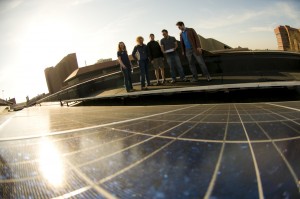Energy systems are in transition from predominantly centralized fossil-fuel and nuclear-based infrastructures to more efficient and heterogeneous renewable-based configurations that include a diversity of different kinds of decentralized, distributed energy. This energy transition is much more than a technological substitution; this transition also includes major social innovations including institutional and cultural changes related to expectations for how individuals, households, communities and organizations use and manage energy. The renewable energy transition also has huge potential to redistribute the political “power” associated with huge multi-national conventional energy companies. This political potential of the local, distributed, abundant, and renewable characteristics of renewable-based energy systems has contributed to growing popularity of the concept of “energy democracy.”
To date, investment in and education for the energy transition has focused primarily on technology and advancing technological innovation. To accelerate change and counter inevitable resistance from the status quo, social innovations also need to be included in energy education, researched, supported and experimented with. New institutional models need to be developed for electric utilities that are critical energy organizations to embrace and facilitate, rather than resist, change. The societal benefits of renewable-based job creation need to be articulated more clearly to justify new job training programs to meet the growing demand for skilled workers in renewable energy. And we need to better understand and acknowledge the multiple positive societal impacts of expanding the diversity of the individuals engaged in the energy sector. Having more women and other under-represented minorities not only creates new opportunities but can also accelerate both social and technological innovation.
Strengthening the technical side of energy education while expanding beyond engineering, to include sociology, policy, economics, psychology and the environment, is critical to preparing students and society for the renewable energy transition. Connecting social and technical innovation within energy education is essential to support the systemic change that is occurring.

The answer to the first question, “What do you see as the principal non-technology, non-economic challenges in transitioning to renewable-based energy systems?” is quite straightforward and mostly unrelated to education.… Read more »
“Energy systems are in transition from predominantly centralized fossil-fuel and nuclear-based infrastructures to more efficient and heterogeneous renewable-based configurations that include a diversity of different kinds of decentralized, distributed energy.”… Read more »
Lewis: As I state above, fossil fuels are highly subsidized, both directly and indirectly, and are probably the most expensive form of energy at our disposal when life cycle costs… Read more »
Schools, colleges/universities, and government workforce development programs have a key role to play in effectively transitioning the U.S. and global economy to be based on clean energy. All students must… Read more »
Lewis … It has been awhile since I read anything by Pielke, so I just looked up his Iron Law. Please tell us where you find those conclusions supported today,… Read more »
This discussion thread so far illustrates, I think rather poignantly if not directly, the tower of babel that the larger energy debate has become. However thoughtful, experienced, or well-researched a… Read more »
How do you change things when change is hard? One of the techniques described by Chip and Dan Heath in their book “Switch” is to follow the bright spots. Find… Read more »